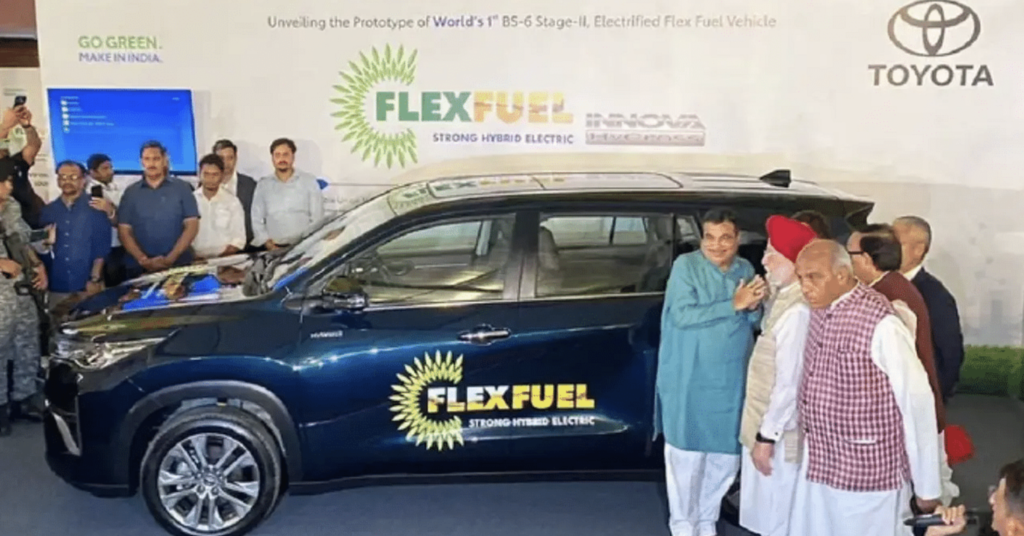In a groundbreaking move towards more sustainable transportation, Nitin Gadkari, the Union Road Transport and Highways Minister, introduced the world to the Toyota Innova Highcross prototype – a pioneering flex fuel vehicle that operates on 100% ethanol fuel. Developed in line with the BS6 Stage-2 regulations, this remarkable car showcases a hybrid system capable of generating 40% of its electricity from ethanol fuel. With ethanol priced at approximately Rs 60 per litre, significantly cheaper than petrol’s current rate of around Rs 100 per litre, this innovation holds immense promise for economical and eco friendly mobility.

Nitin Gadkari Introduced Toyota Innova which Operates on 100% Ethanol Fuel
Gadkari, during the unveiling, emphasized the critical issue faced by ethanol-powered vehicles – the lack of ethanol refueling infrastructure across the country. To address this challenge, he appealed to the Petroleum Minister to direct all petroleum companies to establish ethanol pumps, thus fostering the growth of this cleaner alternative.
The event saw Nitin Gadkari highlighting four major points:
1. Reducing Fuel Imports and Pollution: With fuel imports amounting to a staggering 16 lakh crores, the country faces a considerable challenge. Gadkari stressed that 40% of India’s pollution stems from fossil fuel consumption, making a transition to cleaner alternatives a top priority.
2. Revolutionizing the Ethanol Industry: The Indian Oil plant in Panipat stands as a testament to the country’s efforts in creating a sustainable future. Producing 1 lakh tonnes of bio-ethanol and 150 tonnes of bio-vitamins from straw, the industry is a boon to farmers and the environment alike.
3. Boosting the Economy and Agriculture: Gadkari projected that once the ethanol economy reaches 2 lakh crores, the growth rate of agriculture could surge from 12% to 20%. This, in turn, would contribute significantly to realizing India’s dream of self-reliance and open doors to international ethanol markets.
4. Venturing into Aviation Biofuels: the event also showcased advancements in aviation biofuels. Spicejet’s successful test flight between Dehradun and Delhi, powered by a blend of 75% aviation turbine fuel and 25% biofuel, highlighted the potential of eco-friendly aviation solutions.
Beyond Toyota’s strides, Maruti is also actively developing flex-fuel vehicles. Their Wagon R prototype, unveiled at the Auto Expo, can run on a mix of 85% ethanol fuel, contributing further to the evolution of sustainable mobility.
Ethanol, a type of alcohol derived from the fermentation of starch and sugar, is emerging as a key player in the transition to eco-friendly fuels. Typically blended with petrol, it provides a greener alternative for vehicles. While sugarcane juice remains a primary source of ethanol, other starch-containing materials like corn, rotten potatoes, cassava, and vegetables can also be utilized for production.
Can Ethanol Completely Replace Petrol In the Fuel Consumption of Cars?
- Cost-Efficiency at its Core: Ethonel fuel stands out for its affordability offering a noteworthy cost advantage over conventional petrol. With a price tag of approximately ₹60 per liter, it presents a stark contrast to petrol’s current rate of around ₹120 per litre. Gadkari’s recent announcement revealed that the forthcoming car model could achieve a mileage of 15 to 20 kmpl, solidifying ethanol’s reputation as a budget friendly fuel alternative.
- Eco-Friendly Evolution: the integration of ethanol into petrol brings with it a positive environmental impact. By reducing the reliance on pure petrol consumption, the emission of pollutants is substantially curtailed. With the use of ethanol, vehicles emit 35% less carbon monoxide, aiding in the fight against air pollution. Additionally, the inclusion of ethanol in fuel blends results in lower emissions of sulfur dioxide and hydrocarbons. This transition to ethanol-fueled vehicles is marked by a commendable 35% reduction in nitrogen oxide emissions, due to the substantial oxygen content present in ethanol.
- Longevity for Engines: The advantages of ethanol extend beyond environmental considerations to the realm of engine performance and longevity. Engines operating on ethanol or ethanol-petrol blends experience lower heat generation compared to pure petrol. The rapid evaporation of alcohol present in ethanol helps prevent rapid engine heating. Consequently, this cooling effect contributes to prolonged engine life, making ethanol an asset in terms of vehicular durability.
- Empowering Farmers: The benefits of ethanol ripple through the agricultural sector as well. With ethanol sourced from crops such as sugarcane and corn, its increased adoption can lead to elevated incomes for farmers. Sugar mills, in particular, stand to gain an additional revenue stream, thereby bolstering the overall income for the agricultural community. Remarkably, this shift towards ethanol has already contributed a substantial Rs 21,000 crore to farmers’ earnings.
- Economic Boost for the Nation: Gadkari’s vision for an ethanol-fueled future extends to economic prosperity as well. He underscores that this fuel has the potential to curtail the expenditure on petroleum imports, a critical economic concern for India. Currently, the nation’s economy bears the weight of a Rs 16 lakh crore import cost, a burden that could be alleviated through the adoption of ethanol-based fuels. Such a reduction in petroleum imports could pave the way for a more self-reliant economic model.
All Type of Ethanol Fuel:
1G Ethanol: primarily sourced from sugarcane juice, sweet beet, rotten potatoes, sweet sorghum, and corn.
2G Ethanol: Derived from cellulose and lignocellulosic materials, such as rice husk, wheat husk, corncob, bamboo, and woody biomass.
3G Biofuel: A future prospect, this generation of biofuel is expected to be made from algae, with ongoing research in this area.
The introduction of the Toyota Innova Highcross prototype marks a significant step towards a sustainable transportation future for India. As the country embraces innovative solutions like ethanol-powered vehicles, it moves closer to achieving its goals of reduced pollution, enhanced agricultural growth, and greater energy self-sufficiency.
Nitin Gadkari’s steadfast commitment to greener energy alternatives is evident in his endorsement of various innovative projects. Last year, he flagged off Toyota’s flex-fuel pilot project with the introduction of the Toyota Corolla Hybrid. Notably, his endeavors also extend to cutting-edge technologies like the hydrogen powered Toyota Mirai, which further emphasize India’s dedication to sustainable transportation.
